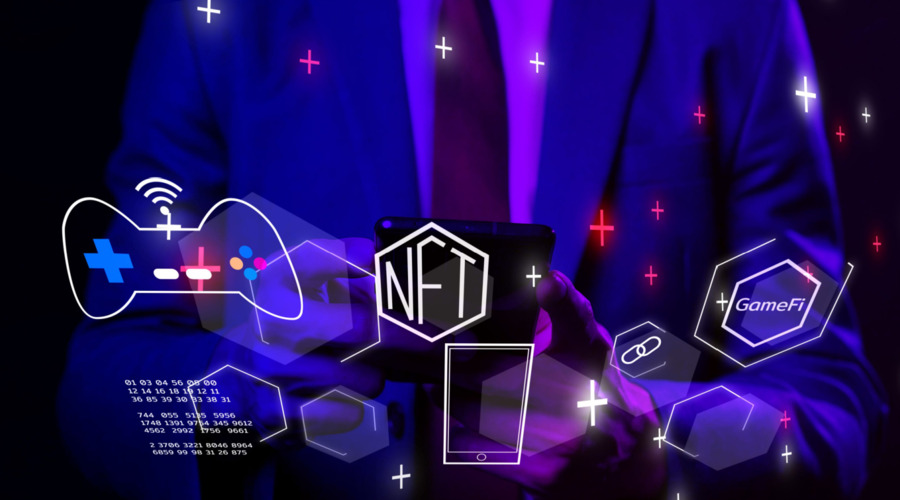As the gaming industry continues to grow, new innovations and technologies emerge, revolutionizing the way people play games. One such innovation is the Non-Fungible Token (NFT) gaming marketplace. NFTs have gained immense popularity in the gaming industry, offering gamers a unique way to own and trade in-game items. In this article, we will delve into the world of the NFT gaming marketplace, explore its benefits, and examine the future of gaming with NFTs.
What is an NFT?
Before we dive into the NFT gaming marketplace, let’s define what an NFT is. An NFT, or Non-Fungible Token, is a unique digital asset that is stored on a blockchain. Each NFT has a unique identifier and is not interchangeable, meaning that it cannot be replaced by another asset of the same value. NFTs can represent anything from digital artwork, music and even in-game items.
The Rise of NFT Gaming Marketplace
The gaming industry has always been at the forefront of technological innovations, and NFTs are no exception. In-game items have been an integral part of gaming for decades, with players spending real money on virtual items that enhance their gaming experience. NFTs take this concept to the next level by giving players full ownership of in-game items, allowing them to buy, sell, and trade items with other players outside of the game.
The first NFT gaming marketplace was launched in 2017 with the game CryptoKitties, which allowed players to collect, breed, and trade digital cats using Ethereum. The game was an instant hit, with some cats selling for over $100,000. Since then, NFT gaming marketplaces have exploded in popularity, with more games and platforms being developed every day.
Benefits of NFT Gaming Marketplace
The NFT gaming marketplace offers several benefits to gamers, developers, and publishers alike. Let’s take a look at some of the advantages of NFTs in gaming.
1. Ownership
One of the primary benefits of NFTs in gaming is ownership. With traditional in-game items, players do not own the items they purchase. Instead, they have a license to use the item within the game. With NFTs, players have full ownership of the item, allowing them to trade, sell, or even gift the item to another player.
2. Transparency
NFTs are stored on a blockchain, which means that every transaction involving the item is recorded and can be traced back to its origin. This offers transparency and ensures that the item is authentic and has not been duplicated or counterfeited.
3. Interoperability
NFTs are not limited to a specific game or platform. Instead, they can be used across multiple games and platforms, allowing players to use their in-game items in different games.
4. Revenue Generation
NFTs offer developers and publishers a new revenue stream. Instead of relying solely on in-game purchases, developers can create and sell unique in-game items as NFTs, generating additional revenue.
The Future of Gaming with NFTs
The NFT gaming marketplace is still in its early stages, and the potential applications of NFTs in gaming are vast. With NFTs, developers can create entirely new revenue streams and offer players new ways to experience and engage with games. NFTs can be used to create unique in-game experiences, such as rare in-game events or exclusive items.
The integration of NFTs into gaming could also lead to new business models. For example, developers could create games that reward players with NFTs, which can be sold or traded for real money. This creates a new form of gaming where players can earn money while playing games, potentially making gaming a full-time job for some players. Additionally, NFTs can also be used to fund game development, allowing developers to raise funds through NFT sales before the game is even released.
The potential applications of NFTs in gaming are not limited to these examples. As technology continues to evolve, we can expect to see more creative ways that NFTs are used in gaming.
Challenges and Concerns with NFT Gaming Marketplace
As with any new technology, the NFT gaming marketplace is not without its challenges and concerns. Let’s take a look at some of the potential issues that need to be addressed.
1. Environmental Impact
The creation and use of NFTs require a significant amount of energy, contributing to the growing concern about the environmental impact of blockchain technology. This is something that developers and publishers need to consider and address.
2. Inclusivity
The high cost of some NFTs may exclude some players from participating in the NFT gaming marketplace. This raises concerns about inclusivity and whether the NFT gaming marketplace is accessible to everyone.
3. Regulation
The NFT gaming marketplace is still largely unregulated, which raises concerns about fraud and scams. It is essential for developers, publishers, and platforms to implement security measures to protect players and prevent fraud.
Conclusion
The NFT gaming marketplace has the potential to revolutionize the gaming industry, offering players new ways to own and trade in-game items. NFTs provide ownership, transparency, interoperability, and revenue generation, creating new opportunities for developers and publishers.
However, the NFT gaming marketplace also poses challenges and concerns, such as environmental impact, inclusivity, and regulation. These issues need to be addressed for the NFT gaming marketplace to reach its full potential and benefit players and the gaming industry as a whole.
